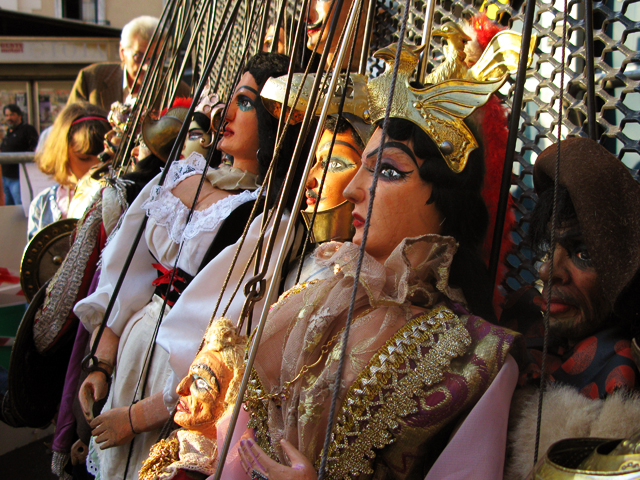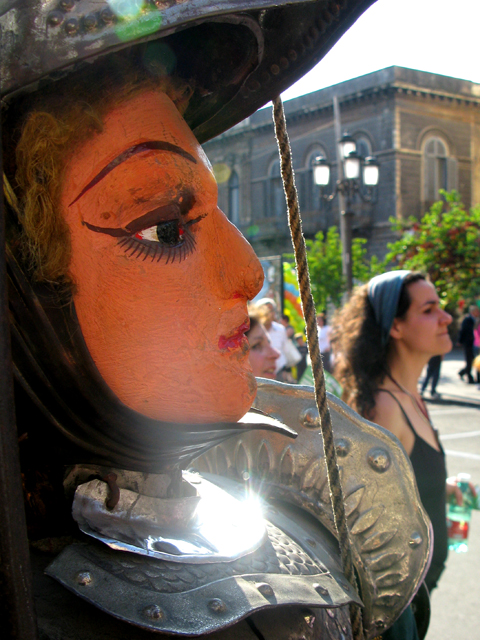 What do you think of when you hear the word ‘puppet’? A quick straw poll on Twitter reveals that the muppets are likely to feature highly. My generation might well also think of Sooty and Sweep. However, it’s another type of puppetry that I’ve got in mind today: marionette shows. Yes, while the rest of Europe was watching Eurovision the other night, I was watching some rather different puppets on strings.
What do you think of when you hear the word ‘puppet’? A quick straw poll on Twitter reveals that the muppets are likely to feature highly. My generation might well also think of Sooty and Sweep. However, it’s another type of puppetry that I’ve got in mind today: marionette shows. Yes, while the rest of Europe was watching Eurovision the other night, I was watching some rather different puppets on strings.
Sicilian puppetry has a long history dating back to the 1800, and Fratelli Napoli, the company that I watched, remain the most significant performers of the Catanese style of puppetry. The company was started in 1921 by Don Gaetano Napoli, and, four generations later, remains completely family-run. Everything, from the making of the puppets, to the construction of the set, to the direction and performance, is done by the Napoli family.
The shows usually feature stories of love and betrayal, with knights and fools and beautiful girls. The two main schools of puppetry in Sicily are Palermitano (from Palermo) and Catanese (from Catania). However, each region’s puppetry is slightly different, with puppets of different sizes and dialects. In Catanese shows, for instance, the Fool is called Peppininu, and he speaks in the dialect specific to Catania. Other characters in the show speak a more general Sicilian, while yet others – the Knights – speak Italian.
The language that’s being spoken, however, is almost irrelevant. It’s amazing how expressive a piece of painted wood can be without any words at all. Every puppet is carved and painted and has a character of its own, which is then heightened by each puppeteer. Their muscles flex and their faces snarl or laugh in conjunction with the character that they’re controlling. There’s a real symbiosis at work. This is all the more interesting given that the voices of the puppets are supplied by a third person: the parruturi. Every character is a combination of puppet, puppeteer and voice artist, and all three elements are visible on stage. A character walks past another character in a complex process involving a change of puppeteer so that the two characters’ strings don’t get entangled. Three characters appear on stage, but there are only two voice artists, so two characters are voiced by one man. Were it not for the fact that you can see it in plain view you’d never know. That transparency and simplicity are part of what makes the show. You can, quite literally, see the strings, and it’s fascinating.
The show that I’m watching features Fratelli Napoli’s smaller puppets – up to 80cm tall. However, when the company first started, their puppets were up to 1m30 tall and weighed up to 35kg. Suddenly the traditional English Punch and Judy shows seem somewhat tame. Originally, also, the puppet shows took place in a permanent theatre. In the 70s, however, things changed. The public were no longer interested in coming to the theatre, so the company decided that they would, instead, take the shows to the public. To this end, in 1973 the puppets were reduced in size to their current dimensions and they took to the road, gaining a new audience and continuing the Catanese puppetry tradition.
In between each scene Alessandro Napoli talks the audience through some of the history of both the show and the company. There’s a sense of reverence in his voice as he introduces his aunt, Italia Chiesa Napoli. She’s nearly 90, apparently, and has been voicing the female characters since forever. She totters to the side of the stage, needing help to get into position, and looking far too frail to be able to cope with any of this. Contrary to appearances, though, her voice is strong and her projection fantastic. She’s amazing!
She’s also miked.
She’s deafening the audience and drowning out the other voice artist – Fiorenzo Napoli, who also happens to be her son. With hysteria in his eyes, Davide Napoli, her grandson, gently takes hold of the microphone that she clutches to her mouth and tries to pull it back an inch or so. She’s having none of it. As the microphone moves away, her head follows after it. Maybe she’s deaf, maybe she’s stubborn, maybe she’s just a diva at heart; we’re going to hear her, and we’re going to hear her loud.
You can’t keep an old actress down.








2 Responses to Puppet on a String